六年级四种时态复习及练习优选稿
小升初四大时态总结复习与练习

③ago系列 一段时间+ago:…前 (几年/几个月/几天/几周)+ago (几小时/几分钟/几秒)+ago two years ago两年前 three months ago三个月前 four weeks ago四周前
five days ago五天前 an hour ago一小时前 five minutes ago五分钟前 two seconds ago两秒前
练习
try _t_r_ie_d______ be___w_a_s_/w__e_re_ do_____d_id____ have__h_a_d______
sleep__s_l_ep__t ____ see__s_a_w______ drink__d_r_a_n_k____ go___w_e_n_t____
一般将来时
1.概念:表示即将发生的动作,未来一段时间将要持续的一段状态或动作。 2.句型: ①主语 +be going to +动词原形. ②主语+will+动词原形+其他. 3.标志词:
①tomorrow系列(早午晚) tomorrow morning明天早上 tomorrow afternoon明天下午 tomorrow evening/night明天晚上 the day after tomorrow后天
make__m__a_k_es___
sing___si_n_g_s___
go__g_o_e_s____ wash__w_a_s_h_e_s__
fix__fi_xs______ watch__w__a_tc_h_e_s_
have___h_a_s____ study__s_tu_d__ie_s__
leave __l_ea_v_e_s___ visit __v_is_it_s____
小学六年级英语_四种时态复习
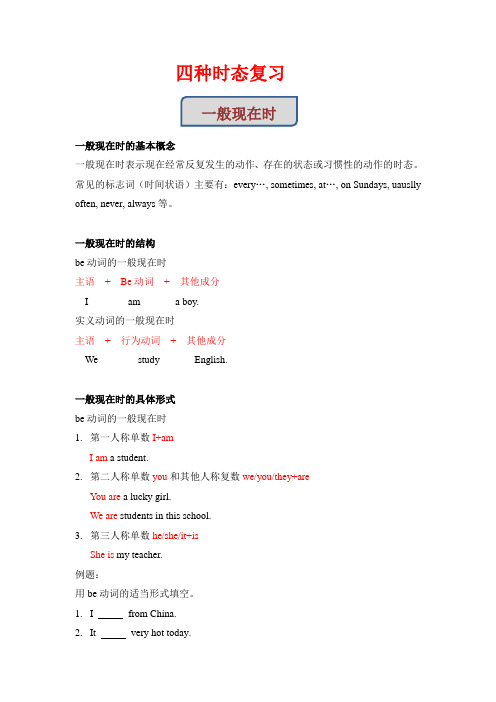
四种时态复习一般现在时一般现在时的基本概念一般现在时表示现在经常反复发生的动作、存在的状态或习惯性的动作的时态。
常见的标志词(时间状语)主要有:every…, sometimes, at…, on Sundays, uauslly often, never, always等。
一般现在时的结构be动词的一般现在时主语+ Be动词+ 其他成分I am a boy.实义动词的一般现在时主语+ 行为动词+ 其他成分We study English.一般现在时的具体形式be动词的一般现在时1.第一人称单数I+amI am a student.2.第二人称单数you和其他人称复数we/you/they+areYou are a lucky girl.We are students in this school.3.第三人称单数he/she/it+isShe is my teacher.例题:用be动词的适当形式填空。
1.I from China.2.It very hot today.3.They in the hospital.4.We good students.5.She a beautiful girl.实义动词的一般现在时1.第一、二人称单数I/you和其他人称复数we/you/they+动词原形I get up at 8 o’clock.They go to school everyday.2.第三人称单数he/she/it+实义动词第三人称单数形式It runs fast.He studies hard.例题:用说给单词的适当形式填空。
1.We home every day.(go)2.Trees green in spring.(turn)3.He very hard.(study)4.The boy up at seven O'clock.(get)5.The earth round the sun.(move)补充:主语为第三人称单数形式,谓语动词的变化规则:状况变化规则发音例词一般情况加-s 清辅音后读【s】浊辅音和元音后读【/】swim-swims;help-helps;like- likes以o结尾的词加-es 读【z】go-goes;do-does 以s,sh,ch,x等结尾的词加-es 读【iz】watches以辅音字母+y结变y 为i再加es 读【z】study-studies尾的词不规则变化动词变have 为has变be为am, is, are have-hasbe-am, is, are一般现在时的句型变化be动词的一般现在时肯定句否定句He is a worker. 主语+ be动词+ not + 其他He is not a worker.一般疑问句特殊疑问句Be动词+ 主语+ 其他特殊疑问词+ 一般疑问句-Is he a worker?Where is he?-Yes, he is. / No, he is not.例题:写出下列句子中所缺的be动词,并用肯定及否定形式回答。
六年级英语总复习—四大时态
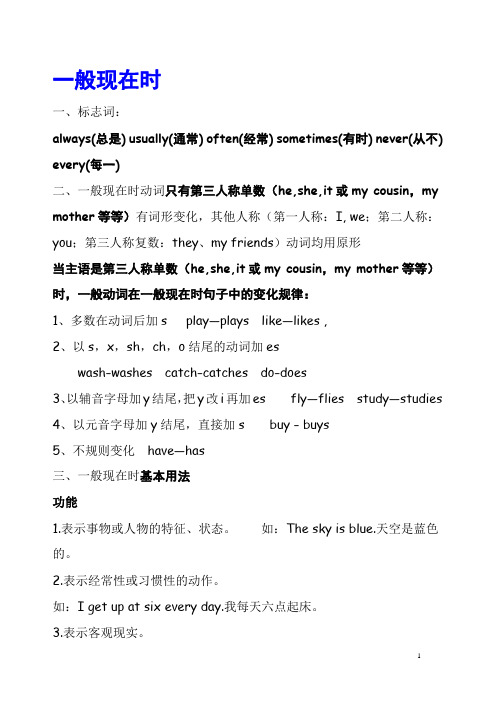
一般现在时一、标志词:always(总是) usually(通常) often(经常) sometimes(有时) never(从不) every(每一)二、一般现在时动词只有第三人称单数(he,she,it或my cousin,my mother等等)有词形变化,其他人称(第一人称:I, we;第二人称:you;第三人称复数:they、my friends)动词均用原形当主语是第三人称单数(he,she,it或my cousin,my mother等等)时,一般动词在一般现在时句子中的变化规律:1、多数在动词后加s play—plays like—likes ,2、以s,x,sh,ch,o结尾的动词加eswash–washes catch–catches do–does3、以辅音字母加y结尾,把y改i再加es fly—flies study—studies4、以元音字母加y结尾,直接加s buy – buys5、不规则变化have—has三、一般现在时基本用法功能1.表示事物或人物的特征、状态。
如:The sky is blue.天空是蓝色的。
2.表示经常性或习惯性的动作。
如:I get up at six every day.我每天六点起床。
3.表示客观现实。
如:The earth goes around the sun.地球绕着太阳转。
The earth is round.构成1. be动词:主语+be(am,is,are)+其它。
如:I am a boy.我是一个男孩。
2.行为动词:主语+行为动词+其它)。
如:We study English.我们学习英语。
句型肯定句:A.be动词:主语+ be + 其它成分He is a worker.B.行为动词:主语+动词(注意人称变化) +其它成分We like the little cat.否定句:A.be动词:主语+ be + not +其它成分They are not students.B.行为动词:主语+助动词(do/does) + not +动词原形+其它成分We don’t like the little cat.一般疑问句:A.be动词: Am / Is /Are +主语+ 其它成分Are you a teacher? Yes, I am. / No, I am not.Are they students of your school.Yes they are / No they aren,t.B.行为动词:助动词(Do/Does)+主语+动词原形+ 其它成分Do you like it? Yes, I do. / No. I don’t .Does he(she) like it? Yes, he( she )does. / No, he ( she )doesn’t.特殊疑问句:疑问词+ 一般疑问句A.be动词:How many students are there in your school?B.行为动词:What do you usually do on Sunday?一般现在时动词be和 have的变化形式1.动词Be 叫连系动词, 用法:第一人称单数(I)用am,第三人称单数(he,she,it或my cousin,my mother等等)用is,其它人称用are。
(完整版)小学六年级英语四大时态总复习练习
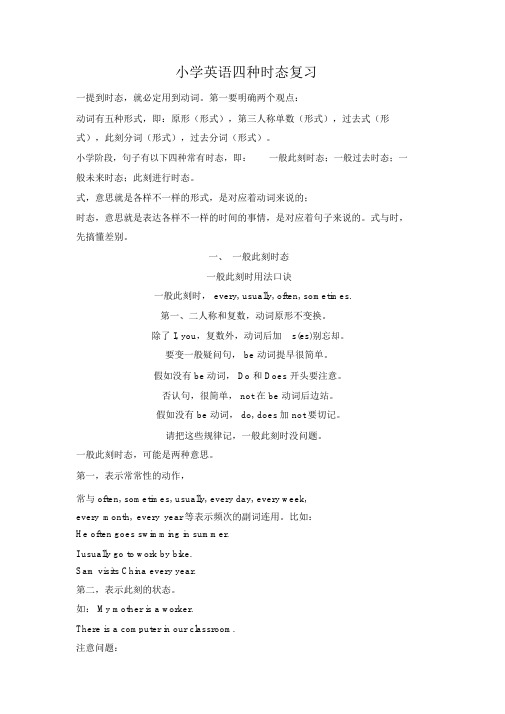
小学英语四种时态复习一提到时态,就必定用到动词。
第一要明确两个观点:动词有五种形式,即:原形(形式),第三人称单数(形式),过去式(形式),此刻分词(形式),过去分词(形式)。
小学阶段,句子有以下四种常有时态,即:一般此刻时态;一般过去时态;一般未来时态;此刻进行时态。
式,意思就是各样不一样的形式,是对应着动词来说的;时态,意思就是表达各样不一样的时间的事情,是对应着句子来说的。
式与时,先搞懂差别。
一、一般此刻时态一般此刻时用法口诀一般此刻时, every, usually, often, sometimes.第一、二人称和复数,动词原形不变换。
除了 I, you,复数外,动词后加s(es)别忘却。
要变一般疑问句, be 动词提早很简单。
假如没有 be动词, Do 和 Does 开头要注意。
否认句,很简单, not 在 be 动词后边站。
假如没有 be 动词, do, does加 not 要切记。
请把这些规律记,一般此刻时没问题。
一般此刻时态,可能是两种意思。
第一,表示常常性的动作,常与 often, sometimes, usually, every day, every week,every month, every year等表示频次的副词连用。
比如:He often goes swimming in summer.I usually go to work by bike.Sam visits China every year.第二,表示此刻的状态。
如: My mother is a worker.There is a computer in our classroom.注意问题:be (am, is, are)动词就是独立的谓语动词,一个句子中有了be(am, is, are)就有了谓语动词了。
句子中不可以同时出现两个谓语动词。
许多同学常常出这样的错误:The boy is often eats hamburgers(.错)应改为: The boy often eats hamburgers.二、此刻进行时态正在进行时态口诀此刻分词用途多,进行时态不用说。
六年级下册英语素材 四种动词时态归纳及试题 全国通用

小学四种动词时态归纳及试题(1)一般现在时:一般现在时的构成1. be动词:主语+be(am, is, are)+其它。
如:I am a boy. 我是一个男孩。
2. 行为动词:主语+行为动词(+其它)。
如:We study English. 我们学习英语。
当主语为第三人称单数(he, she, it)时,要在动词后加"-s"或"-es"。
如:Mary likes Chinese.玛丽喜欢汉语。
动词+s的变化规则1.一般情况下,直接加-s,如:cook-cooks, milk-milks2.以s. x. sh. ch. o结尾,加-es,如:guess-guesses, wash-washes, watch-watches, go-goes3.以“辅音字母+y”结尾,变y为i, 再加-es,如:study-studies一、写出下列动词的单三形式wash_________ watch _______ study______ finish_________ go________ study_________ stop______ be________ teach______fly_____ stay_______ do______ have_______二、.用动词的适当形式填空1.I like ____________ (swim).2.He _________(read) Englishevery day.3.We ______(go)to school at seven in the morning.4.Mike_______(go)to school at seven in the morning.5.My mother_______(like) ______(go) shopping.6.I can ________(draw) many beautiful pictures.7. he________(like)_________(jump) ?8.The teachers (not like)__________(dance).9.The teacher (not like)_________(dance).10.The students___________(speak) English in class.11.The student_________(speak) Chinese after class.12. _______your sister (study) English at school ? No , she__________ . (not )三、用所给的人称改写句子1.I take photos on Sunday. ( Mike)2.We plant beautiful flowers. (she)3.They like playing basketball. (Ben)4.I listen to music every day. (my aunt)四、改句子1.Do you often play football after school? (肯定回答)2.Gao Shan's sister likes playing table tennis (改为否定句)3.She lives in a small town near New York. (改为一般疑问句)4.I watch TV every day. (改为一般疑问句)5.Nancy doesn't run fast.(肯定句)6.I usually play football on Friday afternoon. (否定句: 一般疑问句: 划线提问)●Su Yang usually washes some clothes on Saturday.(同11)●Tom does his homework at home.(同11)(2)一般过去时:动词过去式详解动词的过去式的构成规则有:A、规则动词①一般直接在动词的后面加ed:如worked , learned , cleaned ,visited①以e结尾的动词直接加d:如lived , danced , used①以辅音字母加y结尾的动词要改y为i再加ed(此类动词较少)如study – studied carry – carried worry – worried (注意play、stay不是辅音字母加y,所以不属于此类)① 双写最后一个字母(此类动词较少)如stoppedB、不规则动词(此类词并无规则,须熟记)小学阶段要记住以下动词的原形和过去式:sing – sang , eat – ate ,see – saw , have – had , do – did , go – went , take – took , buy – bought , get – got , read – read ,fly – flew , am/is – was ,are – were , say – said , leave – left , swim – swam , tell – told , draw – drew , come – came , lose – lost , find – found , drink – drank , hurt – hurt , feel – felt一、写出下列动词的过去式is\am_________have_______ plant________ are ________drink_________ play_______ go________ read ________does_________ dance________ worry________ sleep_____buy_________ eat__________ see________ take ______二、用动词的适当形式填空1. It ______ (be) B en’s birthd ay last Friday.2. We all ______ (have) a good time last night.3. I ______(be) an English teacher now.4. She _______(be) happy yesterday.5. _______ they ________ (clean) the room last Sunday? No, they _____.6. We ___________ (go) to school three days ago.7. What ____ you ______ just now? I _______ some housework. (do)8. He _________ (live) in Wu xi two years ago.9. The cat ________ (eat) a bird last night.10. We _______ (have) a party last Halloween.11. They ________ (play) chess in the classroom last PE lesson.三、句型转换1. They played football in the playground.否定句:________________________________________________一般疑问句:____________________________________________ 肯、否定回答:__________________________________________2. Nancy went to school early.否定句:________________________________________________一般疑问句:____________________________________________ 肯、否定回答:__________________________________________3. There was a car in front of the house just now.否定句:________________________________________________一般疑问句:____________________________________________ 肯、否定回答:__________________________________________ 肯、否定回答:__________________________________________(3)一般将来时:基本结构:①be going to + do;①will+ do. be going to = willI am going to go swimming tomorrow(明天). = I will go swimming tomorrow.一、改句子。
pep人教版小学六年级英语概念(四个时态) 总复习
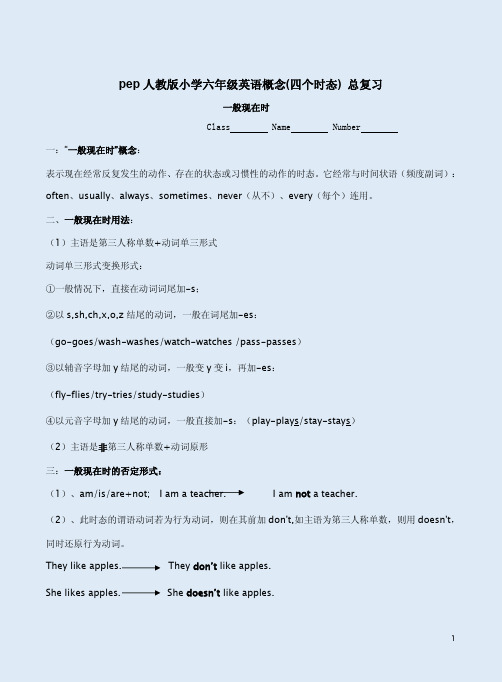
pep人教版小学六年级英语概念(四个时态)总复习一般现在时Class Name Number一:“一般现在时”概念:表示现在经常反复发生的动作、存在的状态或习惯性的动作的时态。
它经常与时间状语(频度副词):often、usually、always、sometimes、never(从不)、every(每个)连用。
二、一般现在时用法:(1)主语是第三人称单数+动词单三形式动词单三形式变换形式:①一般情况下,直接在动词词尾加-s;②以s,sh,ch,x,o,z结尾的动词,一般在词尾加-es:(go-goes/wash-washes/watch-watches/pass-passes)③以辅音字母加y结尾的动词,一般变y变i,再加-es:(fly-flies/try-tries/study-studies)④以元音字母加y结尾的动词,一般直接加-s:(play-plays/stay-stays)(2)主语是非第三人称单数+动词原形三:一般现在时的否定形式:(1)、am/is/are+not;I am a teacher.I am not a teacher.(2)、此时态的谓语动词若为行为动词,则在其前加don't,如主语为第三人称单数,则用doesn't,同时还原行为动词。
They like apples.They don’t like apples.She likes apples.She doesn’t like apples.四:如何改一般疑问句:①把be动词放于句首;He is a student.Is he a student?②用助动词do/does提问—动词还原—句末变问号。
☆还需注意细节变化:如my-your、many-any等。
They like apples.Do they like apples?She likes apples.Does she like apples?一般过去时1.一般过去时表示过去某个时间发生的动作或存在的状态,常和表示过去的时间状语连用。
PEP六年级英语总复习及时态的专项训练
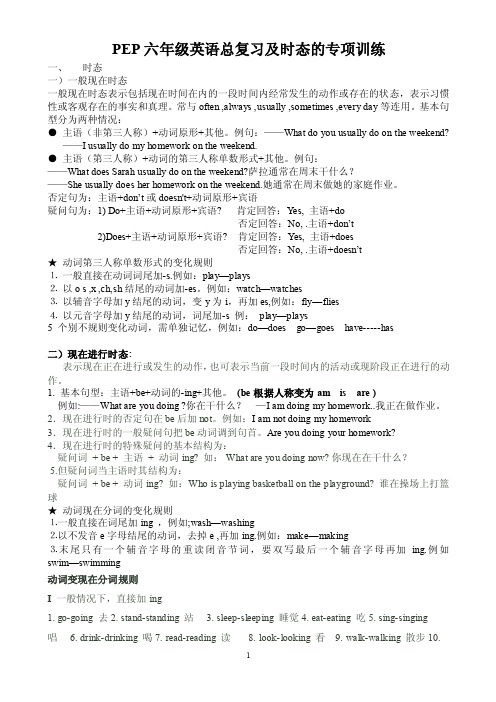
PEP六年级英语总复习及时态的专项训练一、时态一)一般现在时态一般现在时态表示包括现在时间在内的一段时间内经常发生的动作或存在的状态,表示习惯性或客观存在的事实和真理。
常与often ,always ,usually ,sometimes ,every day等连用。
基本句型分为两种情况:●主语(非第三人称)+动词原形+其他。
例句:——What do you usually do on the weekend?——I usually do my homework on the weekend.●主语(第三人称)+动词的第三人称单数形式+其他。
例句:——What does Sarah usually do on the weekend?萨拉通常在周末干什么?——She usually does her homework on the weekend.她通常在周末做她的家庭作业。
否定句为:主语+don‘t或doesn't+动词原形+宾语疑问句为:1) Do+主语+动词原形+宾语? 肯定回答:Y es, 主语+do否定回答:No, .主语+don‘t2)Does+主语+动词原形+宾语? 肯定回答:Yes, 主语+does否定回答:No, .主语+doesn‘t★动词第三人称单数形式的变化规则⒈一般直接在动词词尾加-s.例如:play—plays⒉以o s ,x ,ch,sh结尾的动词加-es。
例如:watch—watches⒊以辅音字母加y结尾的动词,变y为i,再加es,例如:fly—flies⒋以元音字母加y结尾的动词,词尾加-s 例:play—plays5 个别不规则变化动词,需单独记忆,例如:do—does go—goes have-----has二)现在进行时态:表示现在正在进行或发生的动作,也可表示当前一段时间内的活动或现阶段正在进行的动作。
1. 基本句型:主语+be+动词的-ing+其他。
(完整版)小学六年级英语四种时态复习
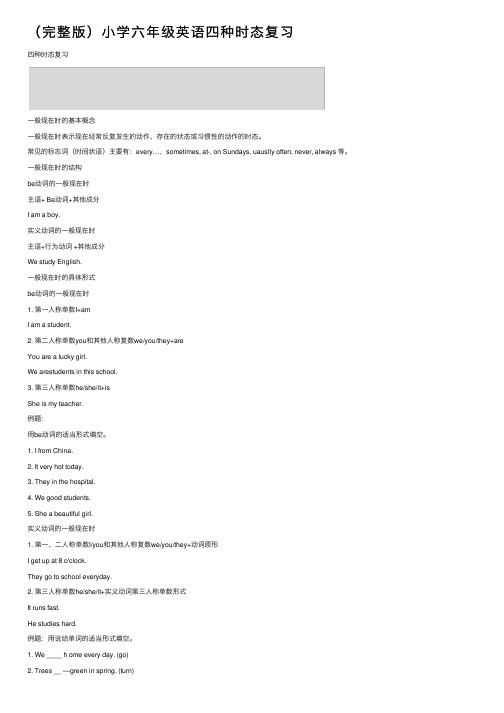
(完整版)⼩学六年级英语四种时态复习四种时态复习⼀般现在时的基本概念⼀般现在时表⽰现在经常反复发⽣的动作、存在的状态或习惯性的动作的时态。
常见的标志词(时间状语)主要有:every…,sometimes, at-, on Sundays, uauslly often, never, always 等。
⼀般现在时的结构be动词的⼀般现在时主语+ Be动词+其他成分I am a boy.实义动词的⼀般现在时主语+⾏为动词 +其他成分We study English.⼀般现在时的具体形式be动词的⼀般现在时1. 第⼀⼈称单数I+amI am a student.2. 第⼆⼈称单数you和其他⼈称复数we/you/they+areYou are a lucky girl.We arestudents in this school.3. 第三⼈称单数he/she/it+isShe is my teacher.例题:⽤be动词的适当形式填空。
1. I from China.2. It very hot today.3. They in the hospital.4. We good students.5. She a beautiful girl.实义动词的⼀般现在时1. 第⼀、⼆⼈称单数I/you和其他⼈称复数we/you/they+动词原形I get up at 8 o'clock.They go to school everyday.2. 第三⼈称单数he/she/it+实义动词第三⼈称单数形式It runs fast.He studies hard.例题:⽤说给单词的适当形式填空。
1. We ____ h ome every day. (go)2. Trees __ —green in spring. (turn)3. He ____ very hard. (study)4. The boy - ___ up at seven O'clock. (get)5. The earth ____ round the sun. (move)补充:主语为第三⼈称单数形式,谓语动词的变化规则:般现在时的句型变化 be 动词的⼀般现在时否定句主语 + be 动词 + not +其他He is not a worker.特殊疑问句特殊疑问词 + ⼀般疑问句Where is he?例题:写出下列句⼦中所缺的be 动词,并⽤肯定及否定形式回答。
小学英语六年级总复习四种十时态的结构和标志词语法讲解及基础练习
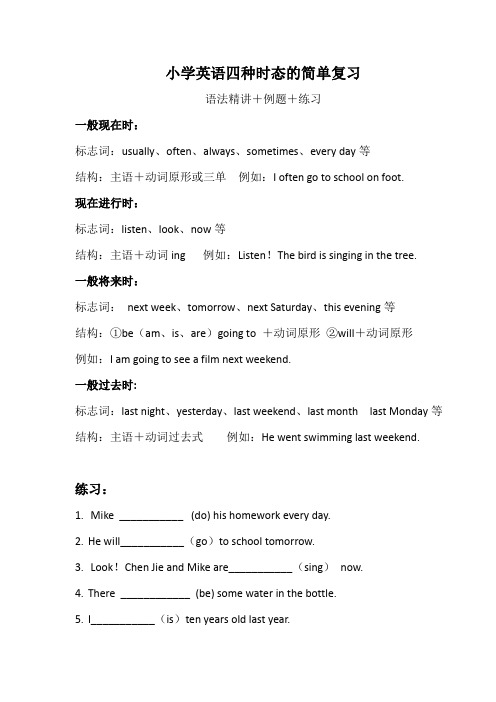
小学英语四种时态的简单复习语法精讲+例题+练习一般现在时:标志词:usually、often、always、sometimes、every day等结构:主语+动词原形或三单例如:I often go to school on foot.现在进行时:标志词:listen、look、now等结构:主语+动词ing 例如:Listen!The bird is singing in the tree.一般将来时:标志词:next week、tomorrow、next Saturday、this evening等结构:①be(am、is、are)going to +动词原形②will+动词原形例如:I am going to see a film next weekend.一般过去时:标志词:last night、yesterday、last weekend、last month last Monday等结构:主语+动词过去式例如:He went swimming last weekend.练习:1. Mike ___________ (do) his homework every day.2.He will___________(go)to school tomorrow.3. Look!Chen Jie and Mike are___________(sing)now.4.There ____________ (be) some water in the bottle.5.I___________(is)ten years old last year.6. We like ____________ (play) basketball after class.7.He___________(ride)a bike with his friend next week.8.My brother is___________(make)kites.9.They___________(do)their homework yesterday.10.We___________(take)a trip over the summer holiday.11. I like singing. I often ____________ (listen) to the music in the evening.12. My grandma ___________ (watch) TV every day.13.Mike didn’t___________(see)a film last night.14.What______you ______ ______ ______ (do)next Saturday.15.Is he___________(watch)TV ?Yes,they are.。
六年级英语时态专项复习
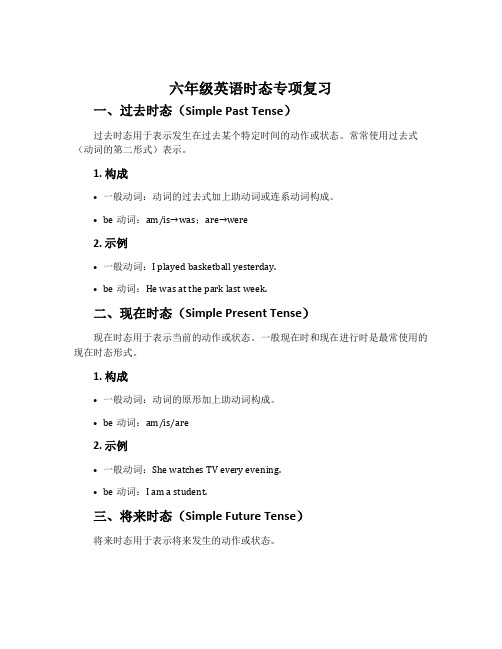
六年级英语时态专项复习一、过去时态(Simple Past Tense)过去时态用于表示发生在过去某个特定时间的动作或状态。
常常使用过去式(动词的第二形式)表示。
1. 构成•一般动词:动词的过去式加上助动词或连系动词构成。
•be动词:am/is→was;are→were2. 示例•一般动词:I played basketball yesterday.•be动词:He was at the park last week.二、现在时态(Simple Present Tense)现在时态用于表示当前的动作或状态。
一般现在时和现在进行时是最常使用的现在时态形式。
1. 构成•一般动词:动词的原形加上助动词构成。
•be动词:am/is/are2. 示例•一般动词:She watches TV every evening.•be动词:I am a student.三、将来时态(Simple Future Tense)将来时态用于表示将来发生的动作或状态。
•一般动词:will + 动词的原形构成。
•be动词:will be2. 示例•一般动词:I will visit my grandparents next week.•be动词:They will be at the party tomorrow.四、现在进行时(Present Continuous Tense)现在进行时用于表示现在正在进行的动作。
1. 构成•一般动词:am/is/are + 动词的现在分词构成。
2. 示例•一般动词:He is eating dinner right now.•be动词:They are playing football in the park.五、过去进行时(Past Continuous Tense)过去进行时用于表示过去某个时间正在进行的动作。
1. 构成•一般动词:was/were + 动词的现在分词构成。
2. 示例•一般动词:She was studying at the library last night.•be动词:They were sleeping when I called.六、现在完成时(Present Perfect Tense)现在完成时用于表示过去某个时间开始,一直延续到现在的动作或状态。
六年级四种时态整合练习复习
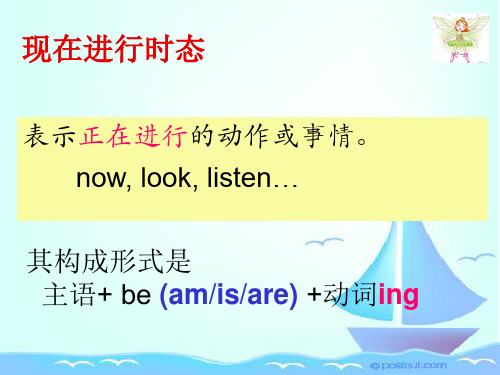
补充填空
1)They__a_r_e__ going to play football _th__is__ af_t_e_r_n_o_o. n
2)Chenjie__i_s__ going
to _r_e_a_d__ a _b__o_o_k__
this evening
How do you usually go to Beijing?
He’s going to the bookstore at 9:00 on Sunday morning.
A:Mom, where are you going in the evening? M:_____________________________________ A: What are you going to buy? M: __________________________________. A: When are you going? M:__________________________________. A: Can I go with you? M: Sure.___________________________? A: I am going to buy some food. M: ______________________________? A: Because we are going to have a picnic. M:________________________________? A : We’ re going to have the picnic tomorrow eyeing.
You are running.
一般将来时态
表示动作将要发生或打算要做的事情。
四种时态复习(讲义)通用版英语六年级下册

四种时态复习一般现在时1.概念:一般现在时表示现在的时间内经常发生的动作或存在的状态,也表示现在习惯性的动作,常与often,usually,never,always,sometimes,every week/ year/ month/ Sunday ..., at weekends, on Sundays等连用。
2.结构:主语为第三人称单数形式,谓语动词的变化规则:一、用be动词的适当形式填空。
1.I from China.2.It very hot today.3.They in the hospital.4.We good students.5.She a beautiful girl.二、用说给单词的适当形式填空。
1.We home every day.(go)2.Trees green in spring.(turn)3.He very hard.(study)4.The boy up at seven O'clock.(get)5.The earth round the sun.(move)三、写出下列句子中所缺的be动词,并用肯定及否定形式回答。
1.—your father a teacher?—Yes, .No, .2.—they in the room?—Yes, .No, .四、将下列句子改写为否定句。
1.I have lunch at school.________________________________________________2.They play basketball on the playground.__________________________________3.Mr. Zhang knows French._____________________________________________五、用说给单词的适当形式填空。
1.He (have) blue eyes.2.We (go) to school everyday.3.She (write) a letter to her friend once a week.4.Tom (ride) a bike to school.5.Peter and Mary often (play) badminton together.6.Practice (make) perfect.现在进行时1.概念:表示现在正在进行的动作或事情。
全国通用六年级下册英语《四大时态集锦》素材
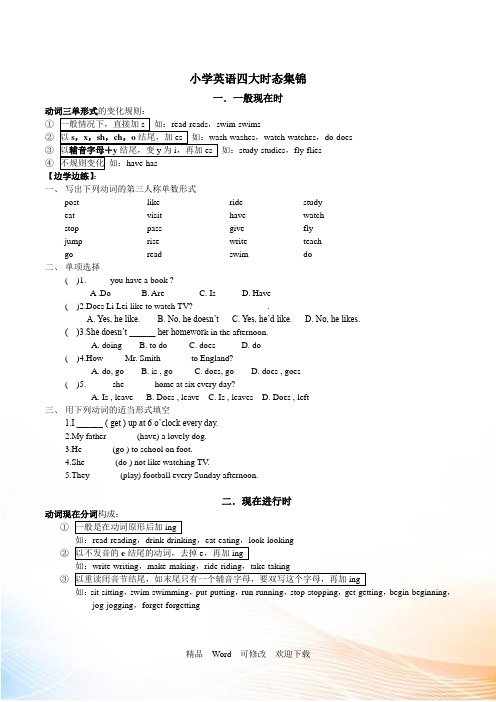
小学英语四大时态集锦一.一般现在时动词三单形式的变化规则:①一般情况下,直接加s 如:read-reads,swim-swims②以s,x,sh,ch,o结尾,加es 如:wash-washes,watch-watches,do-does③以辅音字母+y结尾,变y为i,再加es 如:study-studies,fly-flies④不规则变化如:have-has【边学边练】:一、写出下列动词的第三人称单数形式post__________ eat__________ stop__________ jump__________ go__________ like__________visit__________pass__________rise__________read__________ride__________have__________give__________write__________swim__________study__________watch__________fly__________teach__________do__________二、单项选择( )1._____ you have a book ?A .Do B. Are C. Is D. Have( )2.Does Li Lei like to watch TV? ______________.A. Yes, he like.B. No, he doesn’tC. Yes, he’d like.D. No, he likes.( )3.She doesn’t ______ her homewor k in the afternoon.A. doingB. to doC. doesD. do( )4.How ____ Mr. Smith ______ to England?A. do, goB. is , goC. does, goD. does , goes( )5. _____ she ______ home at six every day?A. Is , leaveB. Does , leaveC. Is , leavesD. Does , left三、用下列动词的适当形式填空1.I ______ ( get ) up at 6 o’clock every day.2.My father ______ (have) a lovely dog.3.He ______ (go ) to school on foot.4.She ______ (do ) not like watching TV.5.They ______ (play) football every Sunday afternoon.二.现在进行时动词现在分词构成:①一般是在动词原形后加ing如:read-reading,drink-drinking,eat-eating,look-looking②以不发音的e结尾的动词,去掉e,再加ing如:write-writing,make-making,ride-riding,take-taking③以重读闭音节结尾,如末尾只有一个辅音字母,要双写这个字母,再加ing如:sit-sitting,swim-swimming,put-putting,run-running,stop-stopping,get-getting,begin-beginning,jog-jogging,forget-forgetting一、写出下列动词的现在分词形式stay __________ do __________ listen __________ suffer __________ refuse __________ close __________ operate _________ die _________ work ________spend _________look _________make __________put __________sit __________run __________tie __________take _________give _________ride _________please _________win _________begin _________open _________lie _________二、用所给动词的适当形式填空1.Mary and Lucy are ________ (dance) now.2.Listen! Someone is _______ (play) the piano in the next room.3.He is __________ (sweep) the floor at the moment.4.Look ! The cat ________ ________ (eat) the fish on the table.5.A: ______ you _______ (study) French ? B: Yes , I am.三、英汉互译1.Billy正在教室里做作业。
版六年级英语四大时态总复习计划练习
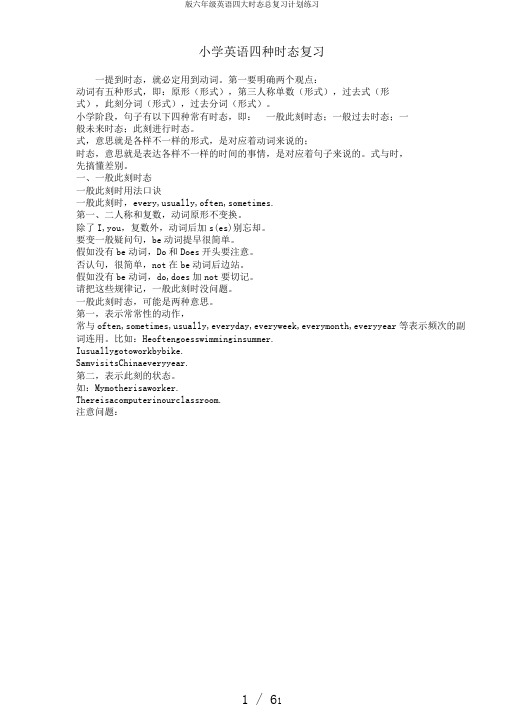
小学英语四种时态复习一提到时态,就必定用到动词。
第一要明确两个观点:动词有五种形式,即:原形(形式),第三人称单数(形式),过去式(形式),此刻分词(形式),过去分词(形式)。
小学阶段,句子有以下四种常有时态,即:一般此刻时态;一般过去时态;一般未来时态;此刻进行时态。
式,意思就是各样不一样的形式,是对应着动词来说的;时态,意思就是表达各样不一样的时间的事情,是对应着句子来说的。
式与时,先搞懂差别。
一、一般此刻时态一般此刻时用法口诀一般此刻时,every,usually,often,sometimes.第一、二人称和复数,动词原形不变换。
除了I,you,复数外,动词后加s(es)别忘却。
要变一般疑问句,be动词提早很简单。
假如没有be动词,Do和Does开头要注意。
否认句,很简单,not在be动词后边站。
假如没有be动词,do,does加not要切记。
请把这些规律记,一般此刻时没问题。
一般此刻时态,可能是两种意思。
第一,表示常常性的动作,常与often,sometimes,usually,everyday,everyweek,everymonth,everyyear等表示频次的副词连用。
比如:Heoftengoesswimminginsummer.Iusuallygotoworkbybike.SamvisitsChinaeveryyear.第二,表示此刻的状态。
如:Mymotherisaworker.Thereisacomputerinourclassroom.注意问题:be(am,is,are)动词就是独立的谓语动词,一个句子中有了be(am,is,are)就有了谓语动词了。
句子中不可以同时出现两个谓语动词。
许多同学常常出这样的错误:Theboyisofteneatshamburgers(.错)应改为:Theboyofteneatshamburgers.二、此刻进行时态正在进行时态口诀此刻分词用途多,进行时态不用说。
小学六年级英语四种时态复习修订稿
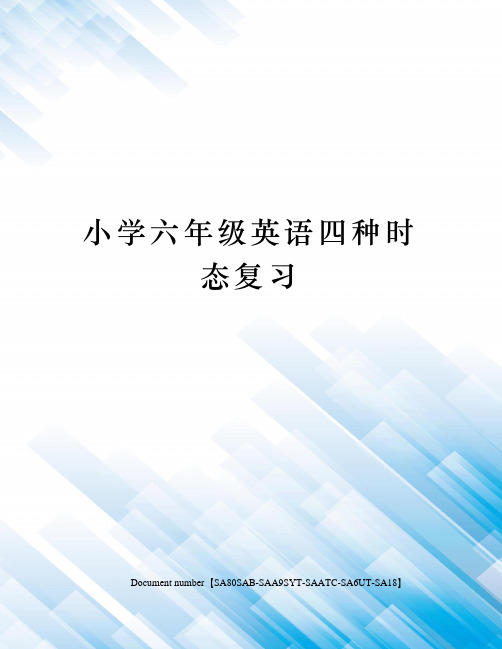
小学六年级英语四种时态复习Document number【SA80SAB-SAA9SYT-SAATC-SA6UT-SA18】四种时态复习一般现在时的基本概念一般现在时表示现在经常反复发生的动作、存在的状态或习惯性的动作的时态。
常见的标志词(时间状语)主要有:every…, sometimes, at…, on Sundays, uauslly often, never, always等。
一般现在时的结构be动词的一般现在时主语 + Be动词 + 其他成分I am a boy.实义动词的一般现在时主语 + 行为动词 + 其他成分We study English.一般现在时的具体形式be动词的一般现在时1.第一人称单数I+amI am a student.2.第二人称单数you和其他人称复数we/you/they+areYou are a lucky girl.We are students in this school.3.第三人称单数he/she/it+isShe is my teacher.例题:用be动词的适当形式填空。
1.I from China.2.It very hot today.3.They in the hospital.4.We good students.5.She a beautiful girl.实义动词的一般现在时1.第一、二人称单数I/you和其他人称复数we/you/they+动词原形I get up at 8 o’clock.They go to school everyday.2.第三人称单数he/she/it+实义动词第三人称单数形式It runs fast.He studies hard.例题:用说给单词的适当形式填空。
1.We home every day.(go)2.Trees green in spring.(turn)3.He very hard.(study)4.The boy up at seven O'clock.(get)5.The earth round the sun.(move)补充:主语为第三人称单数形式,谓语动词的变化规则:一般现在时的句型变化be动词的一般现在时肯定句否定句He is a worker. 主语 + be动词 + not + 其他 He is not a worker.一般疑问句特殊疑问句Be动词 + 主语 + 其他特殊疑问词 + 一般疑问句-Is he a worker Where is he?-Yes, he is. / No, he is not.例题:写出下列句子中所缺的be动词,并用肯定及否定形式回答。
- 1、下载文档前请自行甄别文档内容的完整性,平台不提供额外的编辑、内容补充、找答案等附加服务。
- 2、"仅部分预览"的文档,不可在线预览部分如存在完整性等问题,可反馈申请退款(可完整预览的文档不适用该条件!)。
- 3、如文档侵犯您的权益,请联系客服反馈,我们会尽快为您处理(人工客服工作时间:9:00-18:30)。
六年级四种时态复习及练习集团公司文件内部编码:(TTT-UUTT-MMYB-URTTY-ITTLTY-六上英语四种时态的比较一、概念比较一般过去时:表示过去发生过的事情或过去的状态。
一般现在时:表示现在经常发生的事情或现在的状态。
现在进行时:表示现在正在发生的事情。
一般将来时:表示即将发生的事情或将来的状态。
二、一般过去时:yesterday,thedaybeforeyesterday,lastSunday/week/month/year,twodaysago/aweek ago/threemonthsago/longlongago,justnow,thismorning/afternoon/evening,onSund ay/Saturday,in1998,onceuponatime等。
一般现在时:sometimes,usually,often,always,everyweek/year/Sunday,onSundays/Saturdays,inthemorning(s)/afternoon(s)/even ing(s),attheweekends,afterschool等。
现在进行时:now,look,listen,it’seighto’clock,she’sintheclassroom等。
一般将来时:tomorrow,thedayaftertomorrow,soon,nextyear/week/month,inafewdays,inthefutur e等。
三、句子结构比较一般过去时陈述句(肯定句):主语+was/were+其它。
eg.I was astudenttenyearsago.主语+动词过去式+其它。
eg.Shevisit ed Beijinglastyear.陈述句(否定句):主语+wasn’t/weren’t+其它。
eg.They weren’t atschoolyesterday.主语+助动词didn’t+动词原形+其它。
eg.Mike didn’tgo toschoolyesterday.一般疑问句:Was/Were+主语+其它?eg.Were youathomethismorning?助动词Did+主语+动词原形+其它?eg.Did he watch TVjustnow?特殊疑问句:疑问词+was/were+主语+其它?eg.Wherewas Nancythreedaysago?疑问词+助动词did+主语+动词原形+其它?eg.Whatdid you do lastSunday/Whydid she stay athomeyesterday/Whendid you go homeyesterday?一般现在时陈述句(肯定句):主语+am/is/are+其它。
eg.I am astudent.主语+动词原形或三单形+其它。
eg.Sheoften reads English./Weusually go walkingintheevening.陈述句(否定句):主语+isn’t/amnot/aren’t+其它。
eg.They aren’t atschooleveryday.主语+助动词don’t或doesn’t+动词原形+其它。
eg.Myparents don’tlike watchingTV./Myfather doesn’tlike cooking.一般疑问句:Am/Is/Are+主语+其它?eg.Is LiuTaoyourfriend?助动词Do或Does+主语+动词原形+其它?eg.Do youusually have lunchatschool/Does YangLing go shoppingonweekends?特殊疑问句:疑问词+am/is/are+主语+其它?eg.Howold areyou?疑问词+助动词do或does+主语+动词原形+其它?eg.Howdo you spend yourweekends/ Howdoes he spend hisweekends?现在进行时陈述句(肯定句):主语+am/is/are+动词ing形式(现在分词)+其它。
eg.Thestudents arehaving anEnglishlessonnow.陈述句(否定句):主语+am/is/are+not+动词ing形式(现在分词)+其它。
eg.Look,thedog isn’tsitting infrontofthedoor.一般疑问句:Am/Is/Are+主语+动词ing形式(现在分词)+其它?eg.Listen,is Helen singing inthemusicroom?特殊疑问句:疑问词+am/is/are+主语+动词ing形式(现在分词)+其它?eg.What are they drawing now?一般将来时陈述句(肯定句):主语+am/is/aregoingto+动词原形+其它。
eg.I’mgoingtowatch afilmtomorrow.陈述句(否定句):主语+am/is/are+notgoingto+动词原形+其它。
eg.She is n’tgoingtohave apicnicnextSunday.一般疑问句:Am/Is/Are+主语+goingto+动词原形+其它?eg.Are yourclassmates goingtoplay footballsoon?特殊疑问句:疑问词+am/is/are+主语+goingto+动词原形+其它?eg.Whenis theteacher goingtoteach usthesong?注:无论是哪个时态,都有如下原则:1.有助动词do,does或did,实意动词(行为动词)用原形。
(简略:见助动,用原形)2.有情态动词can,could,should,must,might,will,would等,实意动词用原形。
2.有be动词,要么不能出现实意动词,要么实意动词用ing形式。
(简略:be动、实动不同用,要么be动配现分)六年级英语专项练习班级姓名一、用所给词的适当形式填空。
stSaturday,it__________(rain).2.He__________(write)anemailtohisfriendnow.3.Don’t__________(run)intheclassroomnow.4.LiuTao__________(bring)somebreadyesterday.5.Wewent__________(fish)withmyfriendsthismorning.6.Mikecouldn’t______(ride)bikessixyearsago.7.We_______________(watch)afilmeverySunday.8.They(take)abustogettherelastSunday9.It’s________(he)turn.10.Doyouwant_________(go)tothefarm?11.Look,YangLing(tell)astory.12.Iwant(play)footballwithmyfriends.13.What(do)youdothreeyesterdayago?14.We(see)manymagicthingslastHalloween.15.Mymotherdidn’t(have)amobilephonefouryearsago.16.Myshoesaretoosmall.Iwouldlike(buy)anewpair.17.It(be)Sundayyesterday.18.Fiveyearsago,he_________(can)rideabike.19.NowTomcandomany_________(thing).20.I___________(nothave)amobilephonenow.21.Mike’sgrandpalikes__________(listen)totheradio.22.Mymother_________(work)hardeveryday.23.YangLing___________(wait)forthebusnow.24.Please_________(put)yourhandsonthedesk.25.Iwant__________(be)yourfriend.26.Where________you________(go)yesterday?27.MrBrown______(live)inTokyoin1990.28.Helenusually_________(read)Englishintheevening.29.What_______(do)yourfatherdolastMonday?30.Weoften________(go)totheparkafterdiner.31.He_________(see)afunnyTVshowlastweekend.32.Lily_________(read)astorythedaybeforeyesterday.33.Theboys________(visit)hisuncletwodaysago.34.Theyoften______(clean)theirclassroomafterschool. Look!They_______(clean)it.35.Please_______(pick)anorangeforme.36.There____(be)ateacherandthreestudentsintheclassroom.37.Didyougo__________(fish)yesterday?38.Nancyoften________(water)flowersinthemorning. ButyesterdayNancy_______(not).She_______(water)themintheevening.39.-________(be)youinthezooyesterday?–Yes,I_______(be).40.We______(catch)somefishyesterday.41.Wewateredsomeflowersand(pick)someapples.42.We(have)afashionshowthereyesterday.43.There(be)aheavyrainyesterday.44.I(wear)newclothesthismorning.45.Myfather_______(be)inBeijinglastweekend.46.They_______(visit)afarmlastWednesday.47.Maryoften_______(go)joggingafterschool.48._______you_____(have)breadforbreakfastthismorning?49.Itoften_______(rain)inKunshaninspring.50.--_______(be)youinthezooyesterday?—Yes,I_______(be).51.Letme__________(go)tothecinema.52.We__________(like)music.Nowwe__________(sing).53.She__________(clean)ourclassroomyesterdayafternoon.54.Don’t__________(run)intheschoolnow.55.Fiveyearsago,he__(can)rideabike,butnowhe(can).56.She_______(nothave)amobilephonetenyearsago.Soshe(can)callpeopleanywhere.57.YangLing_______(wait)forthebusnow.58.Sheoften(read)newsontheInternet.59.How(be)yourlastsummerholiday?60.We__________(donot)gofishinglastSunday.61.He_________(live)inWuxilastyear.Buthe__________(live)inJiangyinnow.62.What______(do)hedojustnow?63.Where_____you____(go)yesterday?Ididn’tgoout.I(be)athome.用所给单词的适当形式填空。
